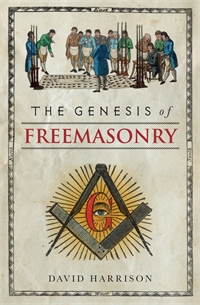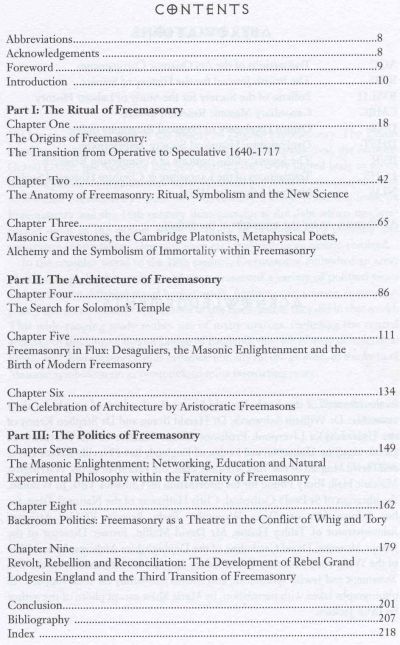
Foreword:
1813 is an important date in the history of English Freemasonry. The Union between the Moderns or Premier Grand Lodge and its main rival, the Antients Grand Lodge, in December that year enabled the newly united body to go on to set its pattern of organisation, styles of regalia and form of ceremonies which established Freemasonry's place in 19th century society. What this book on Freemasonry and the 18th century demonstrates is the debt which this later period owed to the earlier, when so many of Freemasonry's evolving and sometimes contradictory elements were explored and, to an extent, resolved.
In the complex world of the 18th century, Freemasonry embodied an array of different philosophies; its members represented a variety of political views and came from different social backgrounds. Architecture, science, commerce, poetry and art all make an appearance in this book, just as they did in that world. This wide-ranging study makes use of many sources, including the central archives of the United Grand Lodge of England, the rich history of individual lodges and their members, plus evidence literallyon the ground, in the form of Masonic symbolism on gravestones, to tell a fascinating story.
Diane Clements
Director
The Library and Museum of Freemasonry

Book-Review:
Given that of the making of masonic history books there is no end, the Freemason in his state of innocence, must choose to partake from the fruit of this Tree of Life - or not as the case may be. Unusually, the reviewer has paid for his own copy of the subject book; and, as with no regrets this is high commendation indeed. Dr Harrison is a workman of proven skill in the craft of roughing primary and secondary sources into smooth theses.
However, before examining the thesis we could wonder for whom and why such books are written. Is it to impress peers, to challenge student's financial resources or to be devoured by world-wide freemasonry's three million plus starving readership? But, what if any, is the link between the 17th C fraternity and its contemporary namesake?
This brings us to Harrison's thesis which suggests three transitions to account for how Freemasonry developed and evolved in the late 17th and 18thC, how concomitant changes in ritual, symbolism and general ethos occurred and the cultural impact of the Craft. It analyses the important defining components.
The theory of Evolution seeks to account for how species may have changed from one to another by means of natural selection. Has Freemasonry evolved through a process of social selection? If Freemasonry "evolved" from operative to speculative, as Harrison believes, there may well remain missing links to be discovered and the realisation that by becoming species B an entity is no longer species A. This entails that the needs and milieu of species A are no longer relevant for species B. What is the point of telling an elephant that it was once an amoeba?
Perhaps there is the possibility that Freemasonry may, through all of its evolutionary transitions, have retained a defining characteristic which is a unique cultural impact. Not the same cultural impact over evolutionary time but a definable impact over time. That is to say, by providing cultural impact, Freemasonry remains what it was; however, in the absence of cultural impact a name change is due for it no longer is what it was.
The reviewer attended a radical university where the view was taken that only born again Communists were fit to write or teach on the subject. Before Harrison, non-masonic historians proved that they were capable of describing masonic intention; he joins a distinguished line. (Of course, masonic experience is another matter.) Perhaps a merit of The Genesis of Freemasonry is to remind that Freemasonry is a generic term for different species with different characteristics that have survived from different times in different places and are united, only, by links to a common ancestor.
Gerald Reilly
Columnist
PS Review of Freemasonry
|








